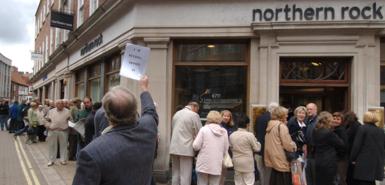Northern Rock
Bank shares rally after Government lifeline
 Northern Rock shares rebounded today in the wake of the Government's decision to guarantee deposits, but customers remained concerned
Northern Rock shares rebounded today in the wake of the Government's decision to guarantee deposits, but customers remained concerned
Shares in Northern Rock rebounded today after the Government guaranteed £28 billion of deposits at the crisis-hit crisis mortgage lender.
The Bank of England also pumped an extra £4.4 billion into the markets to help restore general confidence drained by the Northern Rock furore.
Northern Rock's share price rose by 7.16 per cent to 303p, putting the brakes on a 58 per cent fall since last Thursday, when it was forced to go the Bank of England for emergency funding.
Customers continued to queue, for a fourth day, to withdraw their funds despite the assurance from the Government that their money was totally safe.
The Bank of England meanwhile said that the extra funds it had made available were to "offset the disturbance to conditions in the short-term money markets" caused by providing the lifeline to Northern Rock.
Mervyn King, Governor of the Bank of England, who today met Chancellor Alistair Darling and the Financial Services Authority (FSA), has been criticised over the lack of extra liquidity provided to Britain's banking sector.
But today, Mr King received backing from Prime Minister Gordon Brown and put an extra £4.4 billion into the British banking system, ahead of the same sum being made available on Thursday.
Last night’s intervention by the Government to stem the tide of customer withdrawals from Northern Rock - thought to be upwards of £2 billion - lifted other banks who have seen their share prices suffer on the back of the troubled lender's woes.
Alliance & Leicester's shares rose by 24.25 per cent to 745.5p, making up for a 21 per cent fall in its stock price yesterday, which wiped £1.2 billion off its market value.
Bradford & Bingley also recovered, up 6.27 per cent to 296.5p, while mortgage lender Paragon's shares rose 5.3 per cent to 301p.
However, City cheer failed entirely to allay customer concern. Queues began forming at many of Northern Rock’s 76 outlets early this morning, amid a wave of full-page advertisements from the troubled lender attempting to stop saver withdrawals.
Hector Sants, chief executive of the City's top regulator, the Financial Services Authority (FSA), repeatedly told the BBC's Today programme that the lender was "solvent" and denied that there had been a run on the bank since it was "still open for business".
Mr Sants also said: "Customer confidence has clearly been eroded but we need to consider how that has come about."
Mr Sants refused to answer repeated questions about precisely when the FSA, which is working in conjunction with the Bank of England and the Treasury, began discussions with Northern Rock about the state of its business.
Northern Rock said in a statement: "The Chancellor's statement makes it clear beyond any doubt that all savings in Northern Rock are safe and secure. Consequently, anybody who is in a queue outside a branch, or who is trying to access an online account can be fully reassured that there is no cause for concern whatsoever."
It emerged last night that Lloyds TSB had been in talks with Northern Rock about a takeover as recently as last week, but was stopped from proceeding with the deal. Northern Rock was then forced to go to the Bank of England for funding. So far no other institution has come forward with a takeover bid.
Northern Rock said: “Northern Rock is not in discussion with any other party at the present time. However, the board is aware of its fiduciary duty and is actively considering all strategic options in the interests of shareholders, customers and other stakeholders."
Commenting on the effect of the current turmoil on the housing market, Simon Rubinsohn, chief economist at the Royal Institute of Chartered Surveyors, said there was a 90 per cent chance Britain would not find itself in a similar crisis as the early 1990s, when inflation had peaked and interest rates stayed at 15 per cent for 12 months.
Mr Rubinsohn said house prices are most likely to remain flat over the next years, though there could be spurts of growth as well as falls. "It is incredibly difficult to read," said Mr Rubinsohn: "But the key thing is that the economy is in good shape."
(Published by Times Online, September 18, 2007)
______________________